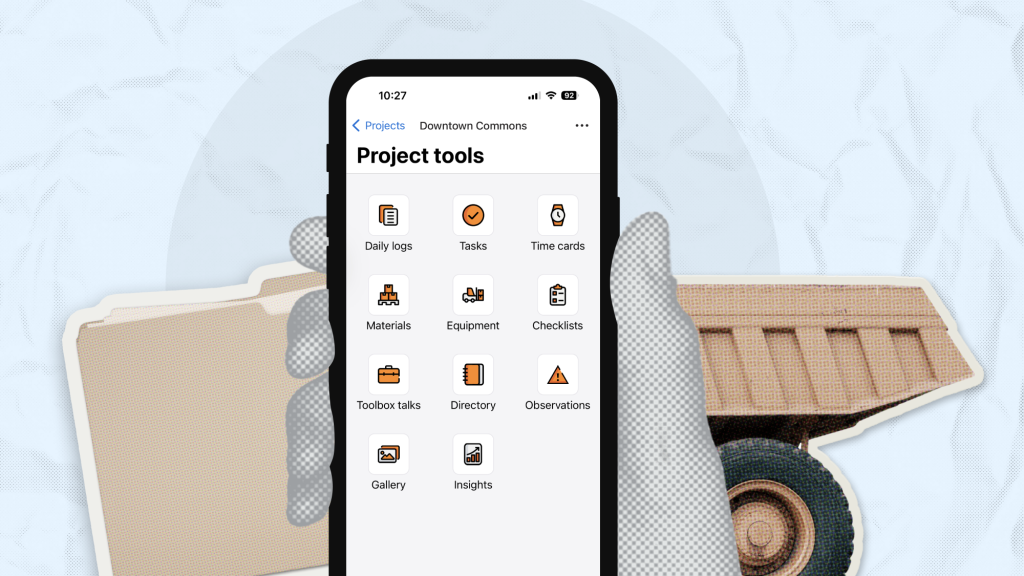Construction work is complex. Without expert management of all the moving pieces, projects easily overspend or veer off schedule.
But what is construction management exactly? What processes do construction managers use to keep projects on track, and what skills do you need to succeed in a construction management position?
This guide defines construction management work in detail and outlines best practices for successful project delivery.
What is construction management?
Construction management is the entire process of coordinating a construction project. It involves planning and organizational tasks as well as the monitoring of costs, timelines, safety, and quality as work is completed.
Definition of construction management
The Construction Management Association of America defines construction management as “a professional service that provides a project’s owner(s) with effective management of the project's schedule, cost, quality, safety, scope, and function.”
The International Risk Management Institute defines construction management as "professional advisory services provided to the owner of a construction project with regard to virtually any aspect of the project".
While official definitions of construction management may vary, one commonality is that "construction management" is an umbrella term for a wide range of responsibilities involved in managing a construction project from inception to completion.
"No matter the setting, a construction manager's responsibility is to the owner and to a successful project," explains the CMAA. In short, construction managers make sure the construction company brings a project to completion and meets their customers' expectations.
The term construction management describes the entire process of coordinating a construction project.
What does a construction manager do?
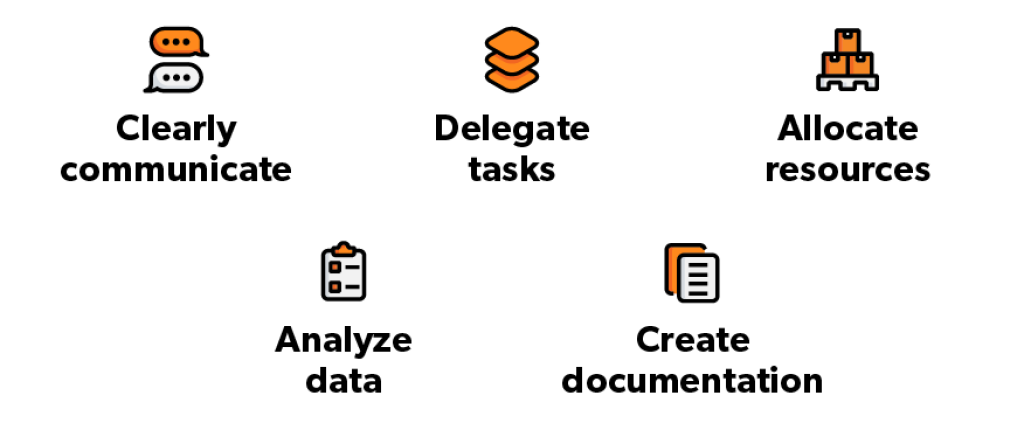
Construction managers work throughout all stages of a construction project. The decisions they make greatly affect the project’s outcome, and their core responsibility is helping a construction company proactively mitigate risks.
In the beginning stages, they are deeply involved in project planning. Once work begins, they assume an active monitoring role to ensure that their field teams meet contract terms and follow proper safety and quality procedures.
If there is an unexpected issue, they respond quickly to facilitate necessary adjustments to the project budget or schedule. Then, once construction is complete, they work with the project owners to ensure a smooth transition.
Throughout the construction process, construction managers must:
Clearly communicate
Delegate tasks
Allocate resources
Analyze data
Create documentation
They need a comprehensive skill set that includes organizational, analytical, and interpersonal skills. They may work directly with both internal and external stakeholders.
A single construction manager can be responsible for an entire project, or they may be a part of a larger construction management team.
The phases of construction management
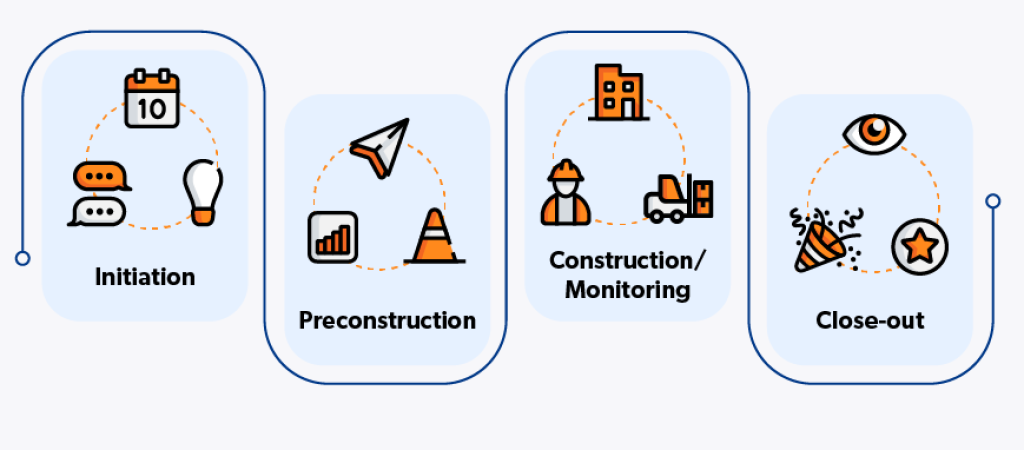
Construction managers generally work in four distinct phases. These include:
Initiation
Preconstruction
Construction / Monitoring
Close-out
1. Initiation
During the initiation phase, construction managers are responsible for determining the feasibility of a proposed construction project. They work with designers, architects, engineers, and other construction professionals to analyze a potential project and make sure it’s a good fit for their business.
Before the initiation stage is completed, a construction manager will:
Define the purpose of the construction project
Set goals and determine objectives
Draft a rough order of magnitude (ROM) including initial estimates for budget and schedule
Reviewing historical data from previous projects helps construction managers make informed decisions during this time. They may draft an initial project plan to help predict risks and ensure profitability.
2. Preconstruction
Preconstruction is a multifaceted phase that sets the tone for the rest of the project. During preconstruction, construction managers set several key processes in motion.
Detailed planning
At this stage, project timelines, budget estimates, and design plans are refined. Contract terms are finalized.
Construction managers may be responsible for coordinating approvals with clients. They need to clearly explain project plans and make sure customers understand the contract.
Good communications during the preconstruction phase prevent disputes and misunderstandings down the line.
Documentation
Documentation is especially important during the preconstruction phase. Construction managers may create several documents that outline how project work will proceed, including:
Scope: This document describes the purpose of the construction project and explains the proposed delivery method in greater detail than what was determined during the initiation phase.
Communications plan: A communications plan outlines how information will be shared between all parties throughout completion of the project. It covers the frequency and methods of communication. It also identifies key contacts and provides their contact information.
Risk management plan: This document outlines exactly how a construction company should respond to common project setbacks. A comprehensive risk management plan will cover multiple scenarios and give construction companies a framework to follow for dealing with different issues on the jobsite.
Work schedule: A detailed work schedule breaks down proposed timelines into an easy-to-follow procedural format.
Hiring
Construction managers will start the hiring process during the preconstruction phase. They will determine how to allocate internal resources and decide what external subcontractors or consultants to bring onboard.
They may be actively involved in interviewing and vetting potential candidates.
Recommended Read
How to Hire Subcontractors for Construction
Learn how construction pros make informed hiring decisions.
Permits and legal requirements
During preconstruction, building permits, general contractor bids, and other legal documents are generally submitted. Design drafts, specifications, and contract terms may need to be submitted alongside requests as a part of this process, and the construction manager helps coordinate their completion.
Ensuring all legal obligations are fulfilled is a part of construction management.
3. Construction / Monitoring
When actual construction work starts, construction management responsibilities evolve from organization and coordination to monitoring. As project plans are executed, the construction manager ensures that all work is completed safely on schedule.
Construction managers monitor:
Quality
Safety
Timelines
Costs
Material usage
Equipment
They are responsible for actively identifying potential problems or errors and correcting them as quickly as possible. If any issues occur, the construction manager will determine the best way to resolve them. For example, if a weather delay sets back a project timeline by several days, the construction manager will adjust the schedule accordingly and inform all parties affected in a timely manner. Likewise, if a supply chain issue causes an unexpected material price increase, they will determine how to best accommodate that change in the project budget.
Most construction managers can’t personally observe the execution of every task, and they rely on daily reporting to monitor project health.
4. Close-out
Once construction work is completed, the project enters the close-out phase. During this phase, construction managers analyze the success of the project and turn over any helpful documentation to the client.
Depending on contract terms, they may also need to coordinate the installation of furniture, fixtures, and equipment (FF&E) or the delivery of attic stock—extra supplies like paint or fuses—to the project owner.
They’ll thoroughly review all project data and measure performance against estimates. They will typically draft a formal report that can be shared with internal stakeholders and clients.
Construction management schools & degrees
In the past, there were few formal educational programs dedicated to construction management. Construction managers learned necessary skills through experience working in different positions in the construction industry.
Today, you can earn a degree or certification in construction management from many reputable institutions throughout the U.S. While work experience is generally still an acceptable substitute for formal education—and in some cases a job requirement—a degree or certification can broaden your skills and give you a competitive edge when applying for construction management positions.
Some educational programs can be completed online or part-time as a working professional.
Top construction management colleges

The following schools offer accredited bachelor’s degree programs in construction management:
University of Houston College of Technology - Houston, TX
Drexel University College of Engineering - Philadelphia, PA (also offered online)
Virginia Polytechnic Institute and State University College of Engineering - greater Washington DC metro area
Indiana State University College of Technology - Terre Haute, Indiana (also offered online)
National University School of Engineering and Computing - San Diego, CA (also offered online)
Louisiana State University College of Engineering - Baton Rouge, Louisiana (also offered online)
Everglades University - Boca Raton, FL (also offered online)
Arizona State University School of Sustainable Engineering and the Built Environment - Tempe, AZ (also offered online)
Minnesota State University College of Science, Engineering, & Technology - Mankato, MN
Kent State University College of Architecture & Environmental Design - Kent, OH
For more options in different states, see this list of the best construction management degree programs.
Top construction management certificate programs
In addition to traditional four year degree programs, many institutions offer construction management or project management professional (PMP) certification. The following certification programs can help you build or refresh your construction management skill set.
Columbia Engineering (online)
Temple University (Philadelphia, PA)
University of California, Berkeley (online)
Ashworth College (online)
Colorado State University (Denver, CO)
Project Management Institute (online)
There are many other certification programs available both online and in person.
Construction manager salaries
Construction management can be a lucrative career opportunity. As of September 2022, the average salary for construction managers in the U.S. is about $118K per year according to Salary.com
Glassdoor lists the average construction manager salary as $136K, while Indeed reports it at $82K with an average $6,000 profit share.
These numbers can vary depending on company size and location.
Construction management jobs
Due to the wide variety of responsibilities, construction management roles are generally high-level positions at construction companies. There are less job openings for construction managers than entry-level titles.
However, in the modern business world, there are plenty of tools available to help applicants find construction management opportunities. You can use industry-specific job boards, recruiters, LinkedIn, or general hiring websites.
These include:
Be sure to list your education credentials, relevant work experience, and construction management skills prominently on your resume.
Construction management software
Construction management software improves the data collection process for both construction managers and field contractors.
Managing a construction project can easily become overwhelming, especially during the monitoring phase. Collecting and analyzing data from the jobsite is often a long and tedious process.
Construction managers rely on field contractors to supply consistent, detailed updates through daily reports, but when field crews are busy with project related tasks, sometimes the quality of data suffers. Managers may spend valuable work hours hunting down and organizing reports before they can even begin to analyze them. This is especially true when construction companies use old-fashioned reporting methods like pen and paper or individual spreadsheets.
Construction management software improves the data collection process for both construction managers and field contractors. It saves time by automating repetitive tasks and streamlining important processes like daily reporting, time tracking, and productivity tracking.
Software also helps organize data and eliminate errors caused by manual data entry. It can show construction managers how projects are performing at a glance and increase real-time project visibility.
The different types of construction management software
Industry-specific digital tools exist for many different construction management responsibilities. Some software is comprehensive and can be used throughout the entire construction management process, while other solutions are tailor-made to improve highly specific tasks.
Software is commonly used to enhance several key processes:
Daily reporting
Production tracking
Equipment management
Material usage
Payroll processing
Safety management
Consider the benefits of the following types of construction management software.
Daily reporting software
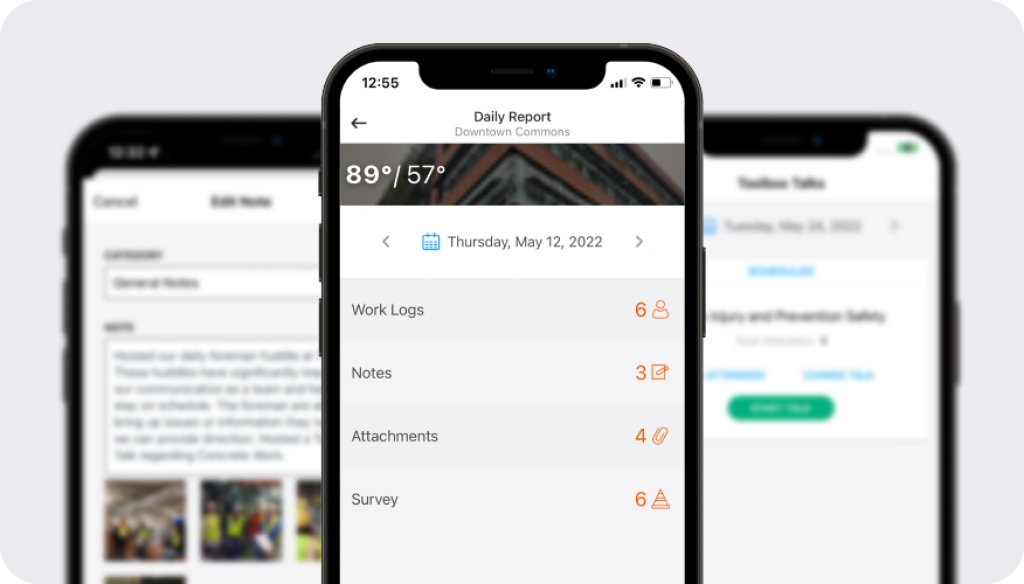
Timely, accurate daily reporting is critical to the success of a construction project. Construction managers primarily use information from daily reports to monitor project health and make informed decisions.
Daily reporting software increases project visibility for construction managers over traditional pen and paper methods. Handwritten reports are time consuming and lead to frequent communication errors. Sometimes construction managers can’t collect, organize, and analyze paper report data efficiently, missing potential issues that eventually lead to costly disputes, rework, and litigation.
With digital reporting, field contractors quickly capture relevant jobsite data using mobile devices and share it with construction managers in real time. They can easily attach visual data like photos and videos, which improve clarity.
Construction managers use digital software to optimize reporting processes and improve the quality of data they receive from the field.
Recommended Read
How to Create a Daily Report
Learn how to craft a daily progress report from scratch and download an example report.
Production tracking software
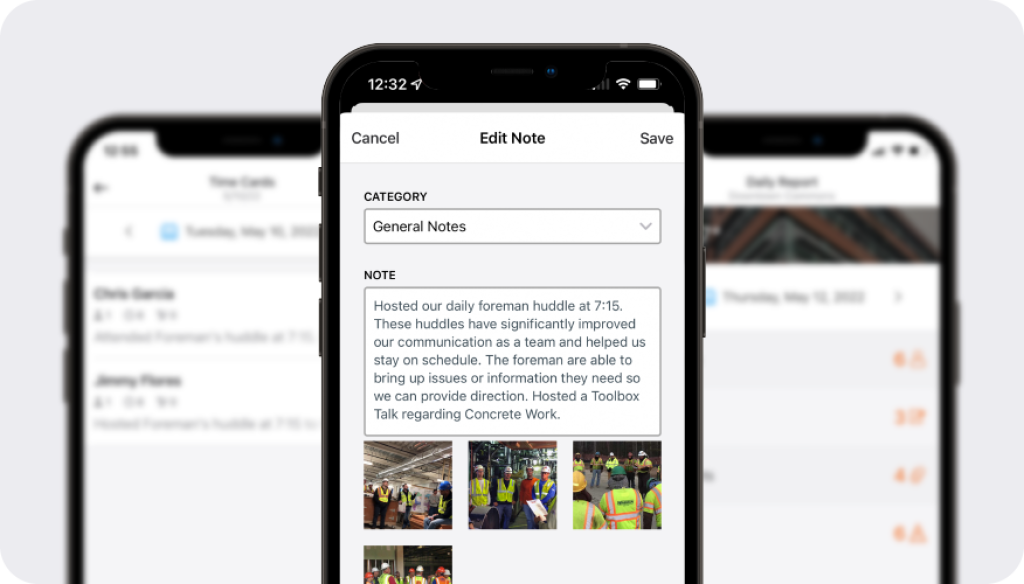
Production tracking helps construction managers organize time, equipment, and materials data so they can see how a project is performing at a glance. Using graphs, charts, and other design elements, production tracking software presents a visual representation of the work that’s been completed and shows construction managers how progress measures up to estimates.
Some production tracking software will also allow construction managers to keep track of:
Equipment - Log where owned and rented equipment is located and when it’s being used.
Materials - Track material usage, costs, and deliveries.
With detailed production tracking, construction managers can more easily determine when change orders are needed and share clear, consistent updates with customers .
Time card software

Just like daily reports, digital construction time cards are faster and more accurate than pen and paper time tracking. Contractors can more easily complete time cards and construction managers can more granularly track labor costs using construction cost codes and other digital methods.
Digital time tracking software will often integrate with accounting systems, to save even more time and reduce errors in payroll processing.
Safety management software
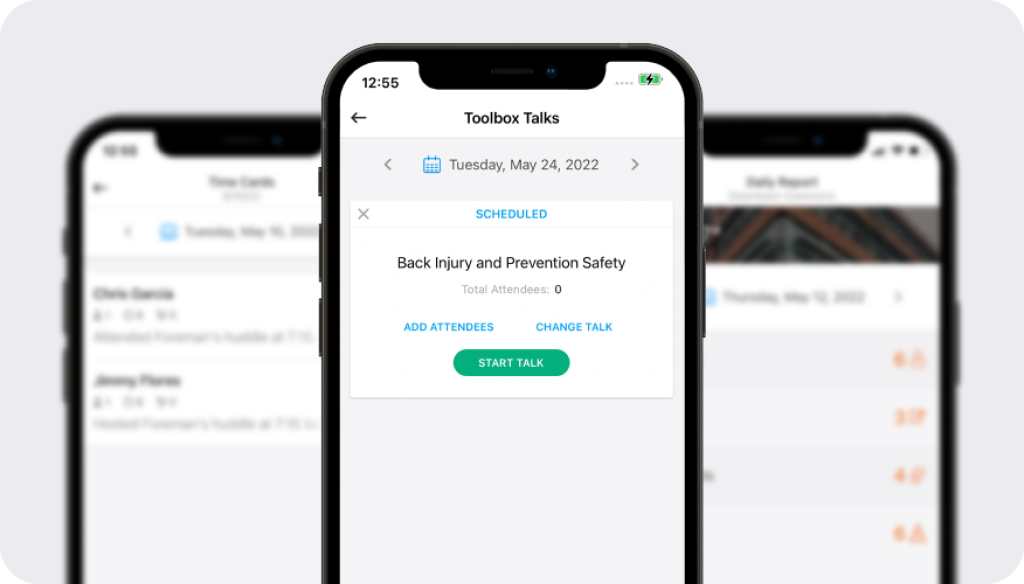
Safety management software provides construction managers with a library of safety tools, such as safety checklists, to help fulfill daily inspection and reporting requirements. Standardized construction checklists take the guesswork out of safety and quality monitoring by giving field contractors a framework for completing these critical tasks.
Checklists keep contractors safer and reduce construction errors. Using checklist software, construction managers may be able to customize their own checklists, to meet the needs of their project exactly.
Webcam monitoring
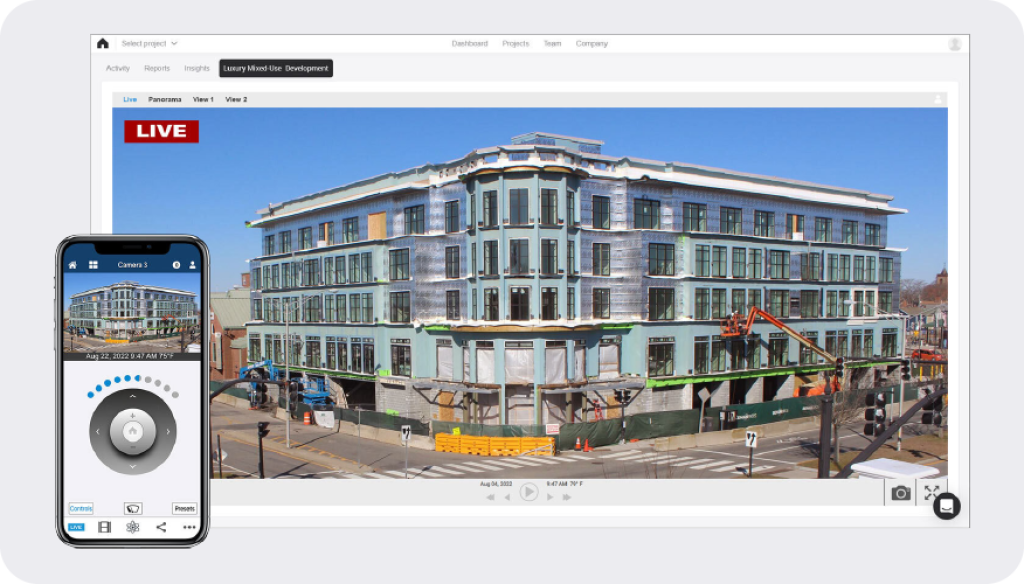
For construction managers assigned to multiple projects across a large service area, it can be difficult or impossible to monitor work onsite in person throughout the project’s duration. Webcam monitoring offers them a clear view of each jobsite from any convenient location.
Cameras are set up in key locations and capture visual data that can be accessed via a web portal. Combined with effective daily reporting, this visibility helps construction managers better identify safety and quality control issues.
The top construction software companies
These industry-leading software solutions help construction managers improve workflows, automate repetitive tasks, and stay organized.
Autodesk Construction Cloud - Complete construction management software suite
Buildertrend - Project planning and bidding software
Raken - Comprehensive construction management app featuring easy-to-use daily reporting capabilities
Foundation - Construction accounting software
Extracker - Change order management software
Contractor Foreman - Construction management software for small-to-medium sized residential and commercial builders
Sage 100 Contractor - Construction accounting software
Egnyte - Secure file sharing
Procore - Construction project management software and CRM system for owners and general contractors
EarthCam - Webcam monitoring system
Holobuilder - 360-degree jobsite photos
In conclusion…
Construction is complex—and so is construction management.
Construction managers shoulder a great deal of responsibility, but while the position can be stressful, it’s also highly rewarding. Careers in construction management pay well, and construction managers can achieve a high level of job satisfaction making a significant difference in profitability.
Construction management is hard work. We make it easier.
Construction management is hard work. We make it easier.
From daily reports to toolbox talks, Raken saves time and improves profitability. Try our digital construction management software today.
